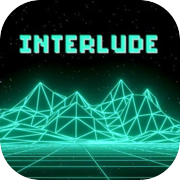Interlude

Recently I moved to a new house in my city. The previous tenant was a weird guy, a programmer working for the government. He left in a hurry and forgot a bunch of things in the attic, including a weird terminal. This terminal gives access to a kind of network of old games - at least dozens of them, and maybe a lot more, I can't tell for sure. The games are linked - you need to clear one to get access to the next. I've been exploring it for a while, and I talked to a few NPCs I met. They keep rambling about a golden city full of treasures that could be found deep in the network. So maybe there's more to it than just games. One thing is certain: this place is huge. Gargantuan. It's too big for a single person to explore. I will need help.
Interlude can be seen as a dungeon crawler with a time-based exploration loop, with one key particularity: each room is an entire game map. The game can be of any genre (action, shooter, platformer, 2D or 3D...), and the map can be of any size and type (from a small room to an entire game world with many biomes and cities)
Each room can be unlocked by paying a fee in the game's currency. The currency is produced by special assets that can be found by exploring/playing the games in the rooms. Thus exploring the dungeon/network and playing its games will make you richer and richer, and allow you to dive even deeper - and maybe, one day, discoverMain features:A time-limited exploration loop. Each week a player can unlock a handful of new rooms. Once you've spent all your currency you will have to wait for several days to produce more currency and resume your progression.
Diversity of gameplay. The games in the rooms can be everything: any theme, gameplay, graphic style, perspective you can imagine. Currently the game features three main genre: FPS, Survival, 2D Platformers. We will add new types of games or focus on some of them depending on feedback from the community.
Asynchronous Co-op Multiplayer. The game features a note-taking/tagging system that lets you place information in the worlds. Joining a team allows you to see the notes your team members left. Teams can be large - several dozens of players. Thus the game becomes a collective exploration effort, and joining a team significantly increases your progression speed.
A treasure. Deep in the dungeon/network, a treasure is hidden in a place called the Core. We don't know what the treasure is, only that it's extremely valuable. There is no way to know where it is, and when it will be found. It might be found in one year or in ten years. The player (or the team of players) that find it will become rich. But remember, what's important is not the destination but the journey!
Good luck!
Interlude can be seen as a dungeon crawler with a time-based exploration loop, with one key particularity: each room is an entire game map. The game can be of any genre (action, shooter, platformer, 2D or 3D...), and the map can be of any size and type (from a small room to an entire game world with many biomes and cities)
Each room can be unlocked by paying a fee in the game's currency. The currency is produced by special assets that can be found by exploring/playing the games in the rooms. Thus exploring the dungeon/network and playing its games will make you richer and richer, and allow you to dive even deeper - and maybe, one day, discoverMain features:A time-limited exploration loop. Each week a player can unlock a handful of new rooms. Once you've spent all your currency you will have to wait for several days to produce more currency and resume your progression.
Diversity of gameplay. The games in the rooms can be everything: any theme, gameplay, graphic style, perspective you can imagine. Currently the game features three main genre: FPS, Survival, 2D Platformers. We will add new types of games or focus on some of them depending on feedback from the community.
Asynchronous Co-op Multiplayer. The game features a note-taking/tagging system that lets you place information in the worlds. Joining a team allows you to see the notes your team members left. Teams can be large - several dozens of players. Thus the game becomes a collective exploration effort, and joining a team significantly increases your progression speed.
A treasure. Deep in the dungeon/network, a treasure is hidden in a place called the Core. We don't know what the treasure is, only that it's extremely valuable. There is no way to know where it is, and when it will be found. It might be found in one year or in ten years. The player (or the team of players) that find it will become rich. But remember, what's important is not the destination but the journey!
Good luck!
Available on devices:
- Windows



